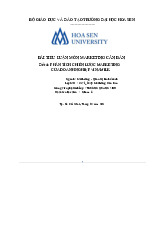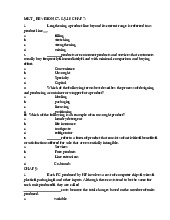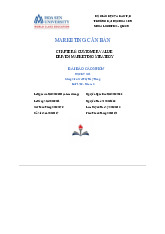



Preview text:
Middlesex University
Intensive Academic English Courses
Name of Student: Hien Tran (Lucie)
Essay: Outline the argument for and against bringing ethics and corporate social
responsibility into business. (Word count: 855)
Ethics is defined as a set of principle that people use to decide what is right and what
is wrong; it reflects the character of the individual and in the contemporary world, the
character of the business firm, which is a collection of individuals. Ethics in the world
business is not a new concept however there are many arguments whether bringing
ethics and corporate social responsibility (CSR) into business. From my perspective,
ethics should be considered in business. This assay will provide some of these
objections and favour of bringing ethics into business.
According to Boatright (1997), making decision involve in any business and it is
considered by the three points of view, there are morality, economics and legacy.
There is an inherent conflict between business and ethics. Customers want to
purchase goods and services at low prices, but businesses want to maximize profits.
Society wants to reduce pollution levels, but businesses want to minimize
compensation costs that environmental regulations add to their operations. Some
people against that ethics and CSR should be brought into business organisations.
First of all, in a no competition market, everybody can earn their benefits because all
products are sold and people can buy whatever they want (Velasquez, 1998).
However, according to Velasquez (1998), competitive takes place everywhere, even
though there are several ways to increase profits which can harm society and 1
because of the higher benefit the higher price so the poor might not afford to
participate in marketplace. This argument seems to correct in the current context.
Thus, ethics tend to exist in competitive market. In Levi Strauss case, because of
intense pressure to decrease cost, many contractors in developing countries
compromise on health and safety standard (Hopkins, 2007).
The second objection is claimed that employees certainly serve their employers as a
loyal agent (Velasquez, 1998). Agent is considered somebody does or represents
business for somebody else. In another word, employees have a duty to serve their
employer as what they want. Velasquez (1998) against this argument because
agreement to serve another is not automatically justify doing wrong on another’s
behalf. For example, workers of Levi Strauss’ subcontractor in Costa Rita were
dismissed if they became pregnant (Hopkins, 2007). This case show a loyal agent
situation; however, it clearly has an effect on Levi‘s reputation.
The final given argument says that obeying the law is enough and ensures ethical
behaviour in business so it not necessary to employ an extra element called “ethics”
(Velasquez, 1998). This argument is objected by Velasquez (1998) that the law and
morality not always come together even some laws are opposite morality. In other
words, it should be distinguished between not violation the laws and unethical
behaviours. For instance, Levi’s eliminated its subcontractors in Uruguay and
Honduras for sewing a competitor’s brand and steal Levi’s designs without
authorization (Hopkins, 2007). They did not violate their countries laws;
nevertheless, they broke an ethical relationship between them and Levi’s.
Those above objections seem to be weak for keeping ethics out of business. In
another hand, there are strong arguments in favour for bringing ethics into business. 2
The first argument was given by Velasquez (1998) is that it cannot discount ethics in
business because ethical behaviour is required in every human activity, included
business. In The Body Shop case - a large multi-local business of skin and hair care,
has a common goal for itself and its thousands workers is that their activities towards
a socially responsible company (Hopkins, 2007). In my opinion, ethics and business need to be are accompanied.
Another favour point out that although Velasquez cannot demonstrate that ethical
business is always more profitable but it is not a drag on profits (Velasquez, 1998).
In other words, if a company donate to social responsibility, its profit would not be
affected. For example, chairman of Soho’s community environmental has donated
30 pence to charities of poor nations from every Neptune pizza sold and this small
sum raises over 1000 pounds a year (Hopkins, 2007). It could be seen in this
situation that CSR and profit do not coincide.
A truly argument about two parties involve in cooperation, ethics exist in business
will bring benefit for both cooperating parties (Velasquez, 1998). For instance, B&Q –
a UK’s biggest home improvement and garden centre retailer – has environmental
friendly policies that are one of the appearances in corporate social responsibility
behaviour; and helps for community supplying it with timber in Papua New Guinea
(Hopkins, 2007). Thus, this is a win – win situation in which, the Baining people have
benefit for employments and maintain forest, local culture; and B&Q can protect
environment and has a stable supply source.
By and large, Lewis (1985) gave a typical definition after a survey about business
writers and professionals that “business ethics is rules, standards, codes, or
principles which provide guidelines for morally right behaviour and truthfulness in 3
specific situations”. Although there are many arguments for bringing ethics and CSR
into business, they seem to be coexisted in the market nowadays. From my
viewpoint, ethics and CSR are very important in every business activities due to their
effects on morality, economics and legacy. References Boatright, J (1997), , New Jersey: Prentice-Hall. pp 1 - 27. Hopkins, M (2003),
, London: Earthscan Publications. pp 88 – 120.
Velasquez, M. G., 1998, Arguments for and against Business Ethics, in
, New Jersey: Prentice Hall, pp 35 – 43.
Lewis, P. V., (1985), Defining “business ethics”: Like nailing jello to a wall, in
, Volume 4, Number 5, pp 377-383 4




